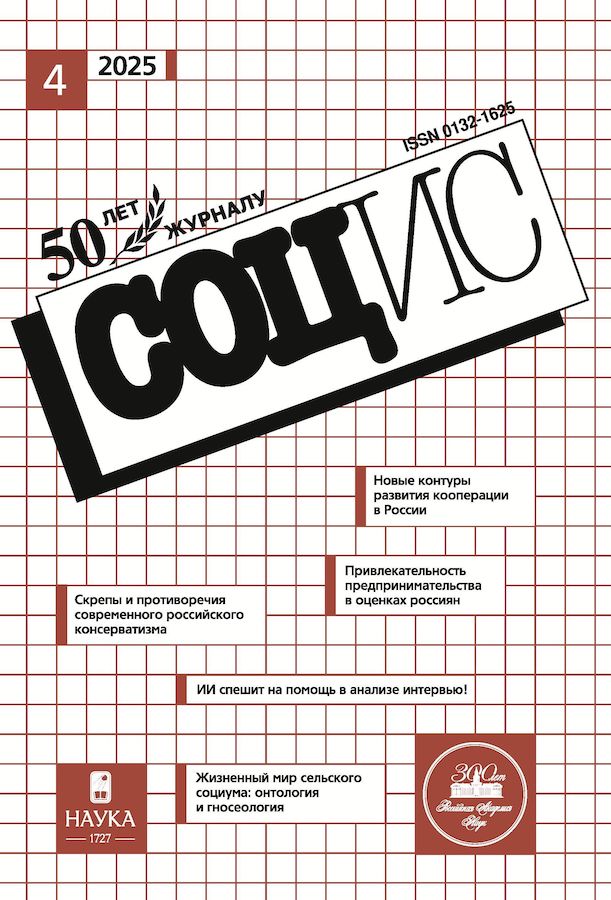P.A. Kropotkin’s ideas about society outside the state and about civil self-government
- 作者: Zotov A.A.1
-
隶属关系:
- Institute of Sociology of FCTAS RAS
- 期: 编号 4 (2025)
- 页面: 94-104
- 栏目: HISTORY OF SOCIOLOGY
- URL: https://ruspoj.com/0132-1625/article/view/684477
- DOI: https://doi.org/10.31857/S0132162525040081
- ID: 684477
如何引用文章
详细
P. A. Kropotkin considered it possible to form and exist in the future a society in which state coercion and inequality of individuals separated by class and class barriers would be replaced by their voluntary associations and free cooperation. His social ideal is the unification of equal and free citizens in the absence of centers of concentration of power. In such a society, the former State should be replaced by a federation of self-governing communities. P. A. Kropotkin’s conversion to anarchism was facilitated by his participation in the narodnik movement, but the main reasons were his rejection of autocracy and the state centralization of the Russian Empire with the privileged position of the feudal nobility. His proposed way of strengthening society from below and destroying the all-powerful state turned out to be a social utopia, especially in Russia. However, P. A. Kropotkin’s ideas about the need to develop civil self-government and cooperation have partially been realized in most countries of Western and Central Europe and in those countries of the world where the central government does not interfere in the competence of local communities.
全文:
作者简介
Andrey Zotov
Institute of Sociology of FCTAS RAS
编辑信件的主要联系方式.
Email: andrzotow@yandex.ru
Research Fellow
俄罗斯联邦, Moscow参考
- Borovoy A. A. (2022) Anarchism. Moscow: RIPOLL Classic. (In Russ.)
- Bulanova M. B., Romanenko L. M. (2014) KROPOTKIN Peter Alekseevich. In: Sociologists of Russia. The history of sociology in person. Bibliographic reference. Moscow: UNITY. (In Russ.)
- Kareev N. I. (1996) Fundamentals of Russian sociology. St. Petersburg. Ivan Limbach Publishing House. (In Russ.)
- Kropotkin P. A. (2021) Anarchy. Preface by S. Y. Nechaev. Moscow: AST Publishing House. (In Russ.)
- Kropotkin P. A. (1867) A trip to the Okinsky guard. Zapiski Imperatorskogo Russkogo Geograficheskogo obshhestva [Notes of the Imperial Russian Geographical Society]. Books 9–10. St. Petersburg. (URL: https://oldcancer.narod.ru/Geography/PAK-PvOk.htm) (In Russ.)
- Kropotkin P. A. (1903) Agriculture, Factory and Handicraft Industries and Grafts in Russian. Moscow: Posrednik. (In Russ.)
- Kropotkin P. A. (1906) In Russian and French Prisons. St. Petersburg: Znanie. (In Russ.)
- Kropotkin P. A. (1922) Mutual Aid between animals and humans as a Factor of Evolution. St. Petersburg: Golos Truda. (URL: https://archive.org/details/kropotrin_vzaimnaya_pomoshch_sredi_lyudey_i_zhivotnykh/page/n11/mode/2up) (In Russ.)
- Kropotkin P. A. (1865) Two trips to Manchuria in 1864. Zapiski Sibirskogo otdela Imperatorskogo Russkogo Geograficheskogo obshhestva. [Notes of the Siberian Department of the Imperial Russian Geographical Society]. Book 8, ed. I: 1–120. (URL: http://oldcancer.narod.ru/Geography/PAK-2Manch.htm) (In Russ.)
- Kropotkin P. A. (1990) Notes of a revolutionary. Moscow: Mysl’. (In Russ.)
- Kropotkin P. A. (1876) Research on the ice Age. St. Petersburg: Printing house of M. Stasyulevich. (In Russ.)
- Kropotkin P. A. (2021) The moral principles of anarchism. In: Kropotkin P. A. Anarchy and morality [Collection]. Moscow: AST Publishing House.
- Kropotkin P. A. (1873) Report on the Olekminsko-Vitim expedition, to find a way to drive cattle from the Nerchinsk district to the Olekminsky district, equipped in 1866. Zapiski Imperatorskogo Russkogo Geograficheskogo obshhestva po obshhej geografii [Notes of the Imperial Russian Geographical Society on General Geography]. (In Russ.)
- Kropotkin P. A. (1921) Speeches of the rebel. St. Petersburg – Moscow: Golos Truda Book Publishing House. (In Russ.)
- Kropotkin P. A. (1990) Bread and freedom. Modern science and anarchism. Moscow, Pravda Publishing House. (In Russ.)
- Kukushkina E. I. (2013) The History of Sociology. Textbook. 2nd ed. revised and expanded. Moscow, INFRA-M. (In Russ.)
- Pirumova N. M. (1972) Peter Alekseevich KROPOTKIN. Moscow: Nauka. (In Russ.)
- Proudhon P. J. (1998) What is property? Moscow: Republika Publ. (In Russ.)
补充文件









